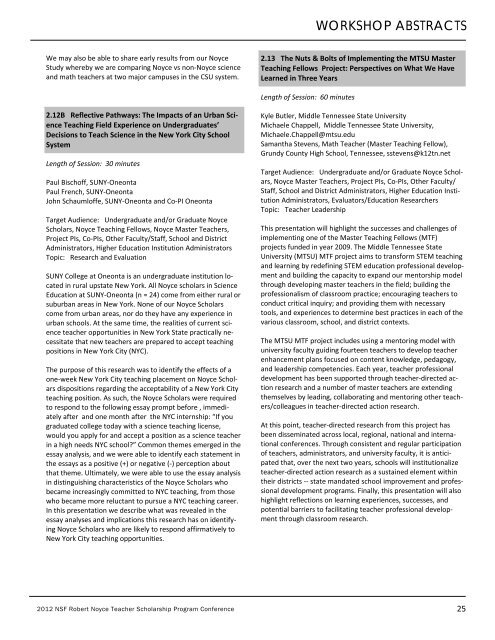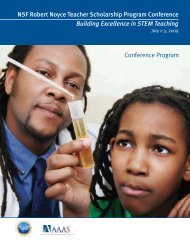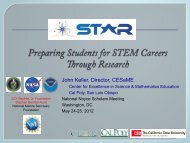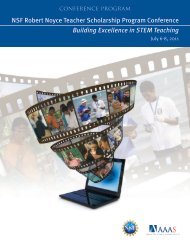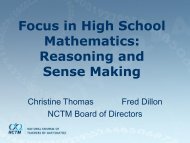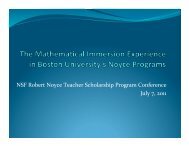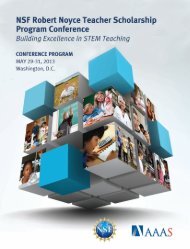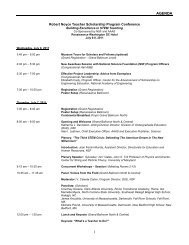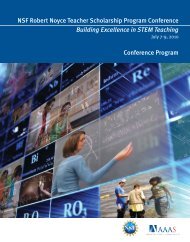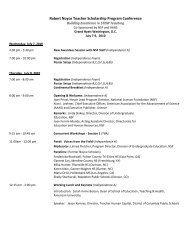WORKSHOP ABSTRACTS2.9 Science NetLinks ‐ An Incredible Resource for Teachersand Students....and It's Free!2.11 An Inquiry‐Based Analysis of the Eno River BasinLength of Session: 60 minutesSarah Ingraffea, AAASKirstin Fearnley, AAASTarget Audience: Undergraduate and/or Graduate <strong>Noyce</strong> Scholars,<strong>Noyce</strong> Teaching Fellows, <strong>Noyce</strong> Master Teachers, School andDistrict AdministratorsTopic: Resources for TeachersDid you know that AAAS provides FREE resources for K‐12 educatorsand students? Did you know that you can go to one placeand find lesson plans, podcasts, interactives, blog posts, mobileapps, and current science news? Science NetLinks, produced byAAAS, is in its 15th year of developing science resources for usein the classroom. <strong>The</strong> award‐winning site was recently redesignedand provides an engaging, thoughtful, and dynamic websitethat will enhance instruction and provide support in all disciplinesof science. Come learn the basics of this incredible site,try out some of its resources, and let Science NetLinks supportyour teaching and student learning.2.10 A Classroom Experience Fostering ExplanationThrough ExplorationLength of Session: 75 minutesLisa S. Loop, Claremont Graduate UniversityChris Brownell, Claremont Graduate UniversityTarget Audience: Undergraduate and/or Graduate <strong>Noyce</strong> Scholars,<strong>Noyce</strong> Teaching Fellows, <strong>Noyce</strong> Master Teachers, Project PIs,Co‐PIs, Other Faculty/Staff, School and District AdministratorsTopic: Resources for TeachersWe will take participants on a journey through a familiar world,where they will see unfamiliar mathematical ideas. Seeking allthe while to encourage a spirit of inquiry into what we believewe know concretely, we will use abstraction to look at basics innew ways that can excite and refresh our vision of what it meansto teach mathematics.Length of Session: 60 minutesMika J. Hunter, Duke University, Durham Public SchoolsTarget Audience: Undergraduate and/or Graduate <strong>Noyce</strong> Scholars,<strong>Noyce</strong> Teaching Fellows, <strong>Noyce</strong> Master Teachers, School andDistrict AdministratorsTopic: Supporting New TeachersTwo Durham high schools with interdisciplinary classes at multiplesites investigated and analyzed water chemistry, biology andbasin geology from the headwaters to the mouth along the EnoRiver. <strong>The</strong> presentation will discuss how to plan and implementan interdisciplinary field trip using the above trip as a case study.2.12 This session includes two 30‐minute presentations.2.12A Fresno State <strong>Noyce</strong> Scholars <strong>Program</strong>s: Ten Years andStill GoingLength of Session: 30 minutesDavid M. Andrews, Fresno State UniversityJaime Arvizum, jaimea@csufresno.edu, Fresno State UniversityTarget Audience: Project PIs, Co‐PIs, Other Faculty/Staff,Higher Education Institution Administrators, Evaluators/Education ResearchersTopic: Research and Evaluation<strong>The</strong> presentation will include a summary of practices, activitiesand outcomes of our 10 years of <strong>Noyce</strong> Scholar/Teacher/Fellow programs at Fresno State. We will share informationconcerning total numbers of <strong>Noyce</strong> I/II teachers and scholarsas well as numbers of Fellows. <strong>The</strong> presentation will also includedemographics including gender, ethnicity; disciplinemajor including second authorization/license area data; stipendvs scholarship support; years our <strong>Noyce</strong> Teachers havebeen in the classroom and how many years beyond the obligationperiod; leadership positions occupied by our <strong>Noyce</strong> Scholars/Teachers/Fellows;professional development includingparticipation in our Western Regional <strong>Noyce</strong> <strong>Conference</strong>s,summer research through PST, STAR, or SRI; special summerprograms, the impact of our Early Field <strong>Program</strong>; examples ofpresentations of <strong>Noyce</strong> Scholars and Teachers at professionalmeetings and other similar activities.24<strong>2012</strong> NSF <strong>Robert</strong> <strong>Noyce</strong> Teacher <strong>Scholarship</strong> <strong>Program</strong> <strong>Conference</strong>
WORKSHOP ABSTRACTSWe may also be able to share early results from our <strong>Noyce</strong>Study whereby we are comparing <strong>Noyce</strong> vs non‐<strong>Noyce</strong> scienceand math teachers at two major campuses in the CSU system.2.13 <strong>The</strong> Nuts & Bolts of Implementing the MTSU MasterTeaching Fellows Project: Perspectives on What We HaveLearned in Three YearsLength of Session: 60 minutes2.12B Reflective Pathways: <strong>The</strong> Impacts of an Urban ScienceTeaching Field Experience on Undergraduates’Decisions to Teach Science in the New York City SchoolSystemLength of Session: 30 minutesPaul Bischoff, SUNY‐OneontaPaul French, SUNY‐OneontaJohn Schaumloffe, SUNY‐Oneonta and Co‐PI OneontaTarget Audience: Undergraduate and/or Graduate <strong>Noyce</strong>Scholars, <strong>Noyce</strong> Teaching Fellows, <strong>Noyce</strong> Master Teachers,Project PIs, Co‐PIs, Other Faculty/Staff, School and DistrictAdministrators, Higher Education Institution AdministratorsTopic: Research and EvaluationSUNY College at Oneonta is an undergraduate institution locatedin rural upstate New York. All <strong>Noyce</strong> scholars in ScienceEducation at SUNY‐Oneonta (n = 24) come from either rural orsuburban areas in New York. None of our <strong>Noyce</strong> Scholarscome from urban areas, nor do they have any experience inurban schools. At the same time, the realities of current scienceteacher opportunities in New York State practically necessitatethat new teachers are prepared to accept teachingpositions in New York City (NYC).<strong>The</strong> purpose of this research was to identify the effects of aone‐week New York City teaching placement on <strong>Noyce</strong> Scholarsdispositions regarding the acceptability of a New York Cityteaching position. As such, the <strong>Noyce</strong> Scholars were requiredto respond to the following essay prompt before , immediatelyafter and one month after the NYC internship: “If yougraduated college today with a science teaching license,would you apply for and accept a position as a science teacherin a high needs NYC school?” Common themes emerged in theessay analysis, and we were able to identify each statement inthe essays as a positive (+) or negative (‐) perception aboutthat theme. Ultimately, we were able to use the essay analysisin distinguishing characteristics of the <strong>Noyce</strong> Scholars whobecame increasingly committed to NYC teaching, from thosewho became more reluctant to pursue a NYC teaching career.In this presentation we describe what was revealed in theessay analyses and implications this research has on identifying<strong>Noyce</strong> Scholars who are likely to respond affirmatively toNew York City teaching opportunities.Kyle Butler, Middle Tennessee State UniversityMichaele Chappell, Middle Tennessee State University,Michaele.Chappell@mtsu.eduSamantha Stevens, Math Teacher (Master Teaching Fellow),Grundy County High School, Tennessee, sstevens@k12tn.netTarget Audience: Undergraduate and/or Graduate <strong>Noyce</strong> Scholars,<strong>Noyce</strong> Master Teachers, Project PIs, Co‐PIs, Other Faculty/Staff, School and District Administrators, Higher Education InstitutionAdministrators, Evaluators/Education ResearchersTopic: Teacher LeadershipThis presentation will highlight the successes and challenges ofimplementing one of the Master Teaching Fellows (MTF)projects funded in year 2009. <strong>The</strong> Middle Tennessee StateUniversity (MTSU) MTF project aims to transform STEM teachingand learning by redefining STEM education professional developmentand building the capacity to expand our mentorship modelthrough developing master teachers in the field; building theprofessionalism of classroom practice; encouraging teachers toconduct critical inquiry; and providing them with necessarytools, and experiences to determine best practices in each of thevarious classroom, school, and district contexts.<strong>The</strong> MTSU MTF project includes using a mentoring model withuniversity faculty guiding fourteen teachers to develop teacherenhancement plans focused on content knowledge, pedagogy,and leadership competencies. Each year, teacher professionaldevelopment has been supported through teacher‐directed actionresearch and a number of master teachers are extendingthemselves by leading, collaborating and mentoring other teachers/colleaguesin teacher‐directed action research.At this point, teacher‐directed research from this project hasbeen disseminated across local, regional, national and internationalconferences. Through consistent and regular participationof teachers, administrators, and university faculty, it is anticipatedthat, over the next two years, schools will institutionalizeteacher‐directed action research as a sustained element withintheir districts ‐‐ state mandated school improvement and professionaldevelopment programs. Finally, this presentation will alsohighlight reflections on learning experiences, successes, andpotential barriers to facilitating teacher professional developmentthrough classroom research.<strong>2012</strong> NSF <strong>Robert</strong> <strong>Noyce</strong> Teacher <strong>Scholarship</strong> <strong>Program</strong> <strong>Conference</strong>25
- Page 1 and 2: NSF Robert Noyce Teacher Scholarshi
- Page 3 and 4: NSF Robert Noyce Teacher Scholarshi
- Page 5 and 6: CONTENTSAbout the NSF Robert Noyce
- Page 7 and 8: AGENDAWEDNESDAY, MAY 23, 20123:30 p
- Page 9 and 10: HOTEL FLOOR PLANS2012 NSF Robert No
- Page 11 and 12: SPEAKER BIOGRAPHIESL’Oreal USA an
- Page 14 and 15: WORKSHOP ABSTRACTSSession I: Thursd
- Page 16 and 17: WORKSHOP ABSTRACTSTarget Audience:
- Page 18 and 19: WORKSHOP ABSTRACTS1.8 Preparing Noy
- Page 20 and 21: WORKSHOP ABSTRACTStutorials for usi
- Page 22 and 23: WORKSHOP ABSTRACTSentation, three o
- Page 26 and 27: WORKSHOP ABSTRACTS2.14 Understandin
- Page 31 and 32: WORKSHOP ABSTRACTSThis session will
- Page 33: WORKSHOP ABSTRACTSColleges for Teac
- Page 36 and 37: WORKSHOP ABSTRACTSlesson and will p
- Page 38 and 39: PI POSTER ABSTRACTS1Title: Teachers
- Page 40 and 41: PI POSTER ABSTRACTSJulie A. Luft, A
- Page 42 and 43: PI POSTER ABSTRACTSClinical experie
- Page 44 and 45: PI POSTER ABSTRACTSon topics includ
- Page 46 and 47: PI POSTER ABSTRACTSof the group at
- Page 48 and 49: PI POSTER ABSTRACTSopportunities. E
- Page 50 and 51: PI POSTER ABSTRACTS3. Partnership w
- Page 52 and 53: PI POSTER ABSTRACTSpated in four ty
- Page 54 and 55: PI POSTER ABSTRACTS41Title: Teacher
- Page 56 and 57: PI POSTER ABSTRACTSpost‐baccalaur
- Page 58 and 59: PI POSTER ABSTRACTSThe internships
- Page 60 and 61: PI POSTER ABSTRACTSin the degree pr
- Page 62 and 63: PI POSTER ABSTRACTSPresenter(s): Ro
- Page 64 and 65: PI POSTER ABSTRACTSSanthi Prabahar,
- Page 66 and 67: PI POSTER ABSTRACTSNicholle Stark,
- Page 68 and 69: PI POSTER ABSTRACTSprograms and dis
- Page 70 and 71: PI POSTER ABSTRACTSresulting in tea
- Page 72 and 73: PI POSTER ABSTRACTSyears. We have m
- Page 74 and 75:
PI POSTER ABSTRACTSschool district,
- Page 76 and 77:
PI POSTER ABSTRACTS95Title: The Noy
- Page 78 and 79:
PI POSTER ABSTRACTS101Title: SUNY C
- Page 80 and 81:
PI POSTER ABSTRACTSresources and su
- Page 82 and 83:
PI POSTER ABSTRACTSThis project als
- Page 84 and 85:
PI POSTER ABSTRACTSThe UCR Noyce Sc
- Page 86 and 87:
PI POSTER ABSTRACTSInstitution: Uni
- Page 88 and 89:
PI POSTER ABSTRACTSedge through the
- Page 90 and 91:
PI POSTER ABSTRACTSand program cont
- Page 92 and 93:
PI POSTER ABSTRACTS136Title: Title:
- Page 94 and 95:
PI POSTER ABSTRACTSIn addition, the
- Page 96 and 97:
PI POSTER ABSTRACTSgoals for next y
- Page 98 and 99:
PI POSTER ABSTRACTS152Title: Univer
- Page 100 and 101:
PI POSTER ABSTRACTSCo‐PI(s): Susa
- Page 102 and 103:
PI POSTER ABSTRACTSwork samples fro
- Page 104 and 105:
PI POSTER ABSTRACTSPresenter(s): Mi
- Page 106 and 107:
PI POSTER ABSTRACTSThe action resea
- Page 108 and 109:
PI POSTER ABSTRACTSin‐service tea
- Page 110 and 111:
SCHOLAR/FELLOW POSTER ABSTRACTSward
- Page 112 and 113:
SCHOLAR/FELLOW POSTER ABSTRACTSers
- Page 114 and 115:
SCHOLAR/FELLOW POSTER ABSTRACTSS/F1
- Page 116 and 117:
SCHOLAR/FELLOW POSTER ABSTRACTScert
- Page 118 and 119:
SCHOLAR/FELLOW POSTER ABSTRACTSThis
- Page 120 and 121:
SCHOLAR/FELLOW POSTER ABSTRACTSS/F4
- Page 122 and 123:
SCHOLAR/FELLOW POSTER ABSTRACTSS/F5
- Page 124 and 125:
SCHOLAR/FELLOW POSTER ABSTRACTSthe
- Page 127 and 128:
POSTER ABSTRACT INDEXAAbraham, Larr
- Page 129 and 130:
POSTER ABSTRACT INDEXEscalante, Mic
- Page 131 and 132:
POSTER ABSTRACT INDEXLandon, Laurie
- Page 133 and 134:
POSTER ABSTRACT INDEXRodriguez, Jen
- Page 135:
POSTER ABSTRACT INDEXZZaikowski, Lo


